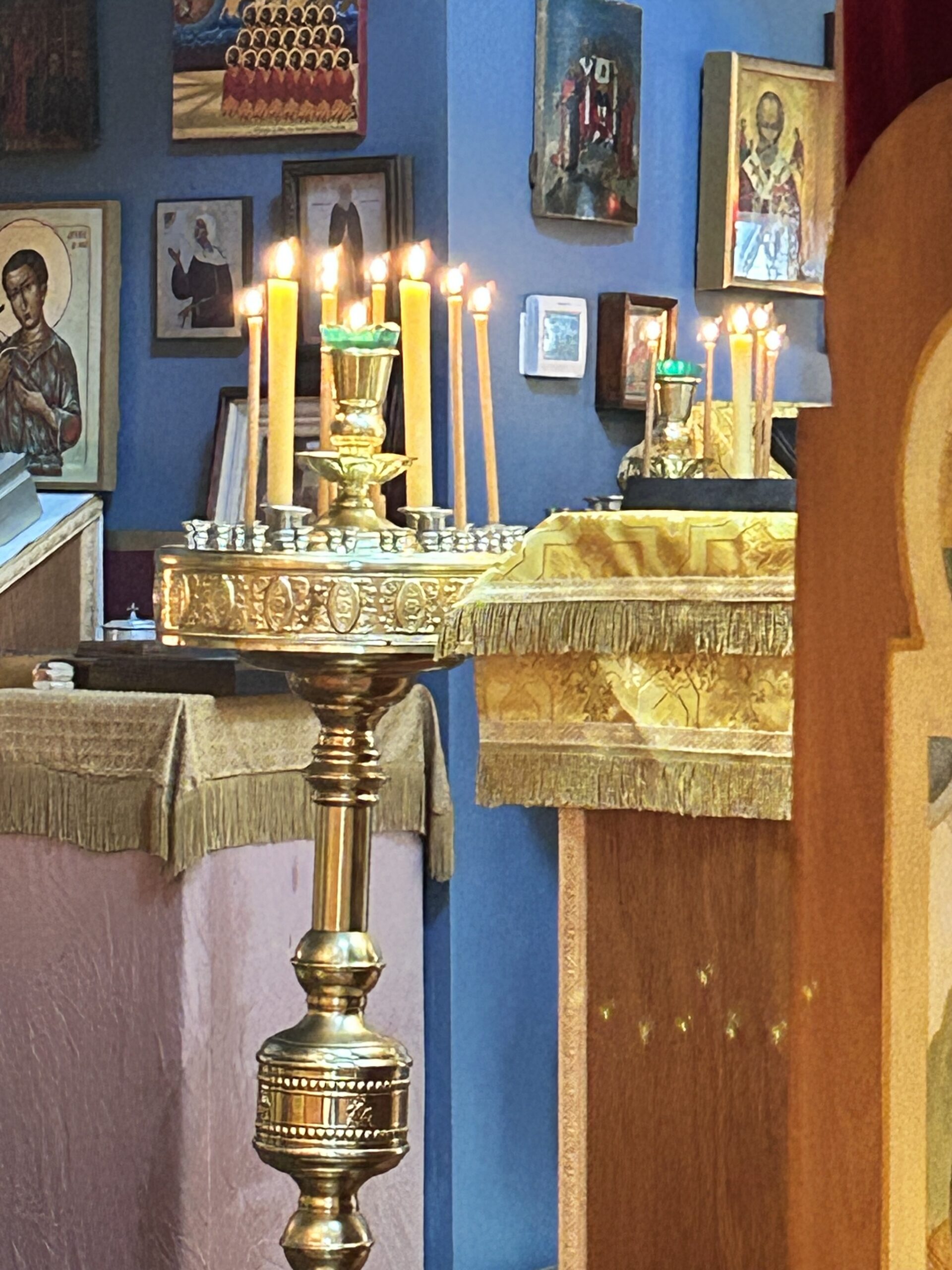Heavenly Worship Must Enter Into The Heart

Every time we Orthodox stand in worship, we must take in the words of the service, and make them our own. Merely observing the service is not worship, as we must enter into Divine Worship with our heart, and give attention to the Word of God that permeates the whole of the services. We must breathe in the Word of God, and let the action of the Word take root in our heart. The Word of God is a Living Word, imparting God’s grace.
The Word, as heard in the readings of the Epistle and the Gospel, and prayed in the liturgical texts, is meant to transform us, as God is making us His holy people. This regeneration takes place when the Word has entered our heart.
Abbot Nazarius of Valaam, taught that we must strive as well as we can “to enter deeply with the heart into the church reading and singing and to imprint these on the tablets of the heart”. This is why it is so important for our spiritual progress to drive out distracting thoughts that confront us, while in worship.
With love in Christ,
Abbot Tryphon
Tuesday September 12, 2023 / August 30, 2023
15th Week after Pentecost. Tone five.
1Sts. Alexander (340), John (595), and Paul the New (784), patriarchs of Constantinople.
Repose of Venerable Alexander, abbot of Svir (1533).
Translation of the relics (1724) of St. Alexander Nevsky (1263).
Uncovering of the relics of St. Daniel, prince of Moscow (1652).
New Hieromartyr Peter priest (1918).
New Hieromartyr Apollinaris (1918).
New Hieromartyr Paul priest and Virgin-martyr Elizaveta and Martyr Theodore (1937).
New Hieromartyr Schema-archimandrite Ignatius (Lebedev) of St. Peter’s Monastery (1938).
Hiero-confessor Archpriest Peter Cheltsov of Smolensk (1972).
Venerable Christopher of Palestine (6th c.).
Venerable Fantinus of Calabria (9th c.).
Synaxis of the Serbian Hierarchs: Sts. Sava I (1235), Arsenius (1266), Sava II (1271), Eustathius I (1285), James (1292), Nicodemus (1325), and Daniel II (1338), archbishops; Sts. Ioannicius II (1354), Spyridon (1388), Ephraim II (1395), Cyril (1419), Nicon (ca. 1439), Macarius (1574), Gabriel I(1659), patriarchs; and St. Gregory (1012), bishop.
St. Barlaam metropolitan of Moldavia (1657) (Romania).
Venerable Bryaene of Nisibis (318).
St. Eulalius, bishop of Caesarea (4th c.).
Sixteen Monk-martyrs of Thebes (Greek).
Six Martyrs of Melitene (Greek).
St. Sarmata of The Paradise (Greek).
Hieromartyr Felix and Martyrs Fortunatus, Septimius and Januarius (Greek).
St. Fiacrius of Brogillum (670) (Gaul).
Translation of the relics of St. Guthlac. Hieromonk of Crowland.
The Scripture Readings
Matthew 11:27-30
27 All things have been delivered to Me by My Father, and no one knows the Son except the Father. Nor does anyone know the Father except the Son, and the one to whom the Son wills to reveal Him. 28 Come to Me, all you who labor and are heavy laden, and I will give you rest. 29 Take My yoke upon you and learn from Me, for I am [a]gentle and lowly in heart, and you will find rest for your souls. 30 For My yoke is easy and My burden is light.”
Galatians 2:21-3:7
21 I do not set aside the grace of God; for if righteousness comes through the law, then Christ died in vain.”
Justification by Faith
3 O foolish Galatians! Who has bewitched you that you should not obey the truth, before whose eyes Jesus Christ was clearly portrayed among you as crucified? 2 This only I want to learn from you: Did you receive the Spirit by the works of the law, or by the hearing of faith? 3 Are you so foolish? Having begun in the Spirit, are you now being made perfect by the flesh? 4 Have you suffered so many things in vain—if indeed it was in vain?
5 Therefore He who supplies the Spirit to you and works miracles among you, does He do it by the works of the law, or by the hearing of faith?— 6 just as Abraham “believed God, and it was accounted to him for righteousness.” 7 Therefore know that only those who are of faith are sons of Abraham.
Mark 6:1-7
Jesus Rejected at Nazareth
6 Then He went out from there and came to His own country, and His disciples followed Him. 2 And when the Sabbath had come, He began to teach in the synagogue. And many hearing Him were astonished, saying, “Where did this Man get these things? And what wisdom is this which is given to Him, that such mighty works are performed by His hands! 3 Is this not the carpenter, the Son of Mary, and brother of James, Joses, Judas, and Simon? And are not His sisters here with us?” So they were offended at Him.
4 But Jesus said to them, “A prophet is not without honor except in his own country, among his own relatives, and in his own house.” 5 Now He could do no mighty work there, except that He laid His hands on a few sick people and healed them. 6 And He marveled because of their unbelief. Then He went about the villages in a circuit, teaching.
Sending Out the Twelve
7 And He called the twelve to Himself, and began to send them out two by two, and gave them power over unclean spirits.
